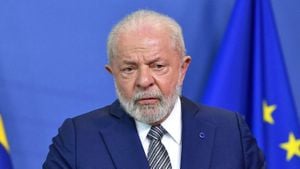London has recently made headlines with the decision to bar a Chinese businessman from entering the UK, stirring concerns over national security and potential diplomatic repercussions. This case has brought to light the curious connections between the unnamed individual, who has been labeled only as 'H6', and Prince Andrew, the Duke of York. It’s not every day you hear tales of royal ties intertwining with international intrigue, but here we are.
According to recent rulings from the UK Special Immigration Appeals Commission, the individual’s connection with Prince Andrew runs deep enough for him to have received an invitation to the Duke’s 2020 birthday celebration. This relationship, as stated by judicial documents, has serious political overtones. The judgement revealed letters from Andrew's aides emphasizing the strength of their ties, hinting at how influential the businessman might be when it came to building connections with high-ranking officials from China.
It’s important to note here the nature of H6's ties: they have been suggested to relate to the Chinese government's extensive networks, particularly its United Front system. This system, established to gather influence and intelligence abroad, is described by Chinese leadership as a ‘magic weapon’ for achieving its overseas objectives. It’s no small affair when you realize the potential for political interference through H6's connections.
The hammer fell for H6 back in February 2023 when he was intercepted on his arrival from Beijing. Authorities informed him he was to be barred from the country. He later challenged this decision, appealing to the Special Immigration Appeals Commission, which upheld the initial ban, marking this as the first public acknowledgment of his ties to the disgraced prince.
Scrutiny over H6 intensified when UK counter-terrorism laws came under play during his prior detainment at the border, where the contents of his phone were seized and analyzed. This analysis revealed alarming connections between him and the Chinese Communist Party. H6’s texts indicated his affiliation with the People's Political Consultative Conference, which forms part of the United Front framework. This was not just any businessman - he was potentially embroiled in activities with significant political ramifications.
H6’s network appears to have included not just Andrew but other prominent UK figures, heightening concerns over potential misuse of influence. The court ruling highlighted how the Duke, who has had his share of controversies over the past few years, might have been vulnerable to exploitation due to pressures he was facing at the time of their bond.
Historical events have cast long shadows over Prince Andrew's reputation - he has faced substantial public scrutiny following allegations of misconduct connected to Jeffrey Epstein. Since then, he has distanced himself from royal duties, retreating from public life, especially after losing his military patronages.
The Strategic Intelligence reports coming out of Britain have likened H6’s situation to other scenarios involving alleged foreign influences within the UK, particularly emphasizing the cautious stance taken by the British government. An MI6 chief has previously branded China as one of the foremost threats to British national security, underscoring the strategic importance of this case.
With the high stakes at play, the British Home Office defended its decision to bar H6, outlining the risks associated with allowing someone with such connections potentially to mingle with political figures.
Outrage from China has also percolated through diplomatic channels. The Chinese embassy has voiced strong disapproval, characterizing the UK's actions as part of larger campaigns rooted in prejudice against China. They condemned the portrayal of H6 as some sort of ‘spy’, arguing it undermined traditional exchanges between the two nations and feeding negativity around Chinese cooperation.
The letters exchanged between H6 and Prince Andrew’s aides indicate how closely knit their interactions were, illustrating how the businessman was not simply unknown; he was positioned to play pivotal roles within the Duke's wider network. One aide eerily emphasized the idea of carefully 'navigated' relationships, perhaps implying endeavors to sidestep scrutiny from other royal staff. Later exchanges between the two point to potential financial ventures intended to engage Chinese investors and partners.
H6's case reveals layers of complexity surrounding international relations, internal politics, and the perils of personal connections within elite circles. With documentation raising alarms over not only their friendship but also the nature of business dealings and the possible ramifications both could have had, it opens up discussions about how relationships are formed and maintained at high levels—even to the point of national security.
While H6 might have lost his battle to enter Britain, the broader discussions around these events are just the tip of the iceberg. How does one navigate such murky waters where personal relationships can potentially interfere with state matters? And what responsibilities do individuals hold when they find themselves caught up between royal duties and international politics? This saga continues to unfurl, keeping us all on our toes.
This entire scenario showcases the intricacies and potential pitfalls of royal connections and international business dealings, reminding us just how closely intertwined relations can get on the global stage. With Prince Andrew’s already tarnished reputation, these revelations add yet another layer of scrutiny to his past associations and the imperatives of maintaining national security.
Notably, Buckingham Palace has kept its distance from commenting on H6’s situation, possibly due to the impending legal challenges and the broader ramifications it could have on Prince Andrew's already fragile standing. But whether this case will lead to any repercussions for royal protocols or political discourse remains to be seen.
Back to the main issue: the intertwining of personal allegiances and national security matters is fraught with challenges. Only time will tell how the relationship dynamics will evolve, especially as nations navigate through the currents of diplomacy and influence. The lesson here might just be about the importance of vigilance and the often blurred lines between public figures and international interests.



